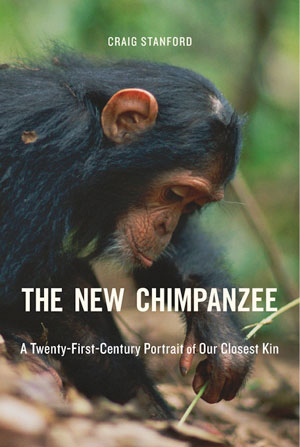
This book is about the lives of chimpanzees living in the tropical forests of Africa. Over the past two decades, scientists have made dramatic discoveries about chimpanzees that will change the way we understand both human nature and the apes themselves. Although there is a rich history of chimpanzee field research that goes back nearly sixty years, almost all of the findings discussed in The New Chimpanzee have been made just since the turn of the millennium. From genomics to cultural traditions, I consider our close kin in a new light and ask what this new information may mean for a new and improved understanding of human nature.
Studying wild chimpanzees is the profession of a very small number of people in the world. At any one time there are probably fewer than a hundred scientists and their students actively engaged in chimpanzee field observation and study. The number of full-time professors in American universities whose careers are focused mainly on wild chimpanzee research is perhaps a dozen. Add in the scholars and conservationists doing work in related areas, and the global army of chimpanzee-watchers is a few hundred strong. The available funding for the work they do is a miniscule fraction of that given to scientists in other scientific endeavors. Yet the results of new studies are front-page news and are rightly touted in the international media for the clues they provide about human nature.
My own involvement with chimpanzees came about fortuitously. In the late 1980s, I was conducting my doctoral research in Bangladesh on a previously little-known monkey called the capped langur. I was living in a ramshackle cabin on stilts at the edge of a rice paddy, spending my days following a group of the monkeys on their daily rounds in the nearby forest. Capped langurs are handsome animals, their gray backs set off by a flame orange coat underneath, and a black mask of skin for a face. Unfortunately, their behavior is not as interesting; they traveled only a hundred meters per day and spent nearly all their waking hours calmly munching on foliage. The most interesting observation I made in thousands of hours with the langurs was the death of an old female at the hands of a pack of jackals. Jackals were not thought to prey on an animal as large as an eight-kilogram monkey, but with the extirpation of leopard and tiger in the area, they may have taken on that role. As I strolled along behind the group one afternoon, the matriarch feeding on the ground right in front of me, a pair of jackals burst from a thicket, grabbed her and dragged her off. It was a vivid demonstration for me of the potential for predators to make a powerful impact on the survival of an individual, and on the population of monkeys in this forest.
As I looked ahead to the completion of my Ph.D. and considered post-doctoral options, I sent off letters to a number of primate researchers in Africa and Asia, proposing projects that involved the study of predation’s effects on wild primate populations. A colleague suggested I write to Jane Goodall. Goodall’s field site in Tanzania had been attacked by a rebel militia in 1975. Four western students were kidnapped and held for ransom in neighboring Zaïre (now the Democratic Republic of the Congo). Although all were eventually released unharmed, the park had been generally off-limits to visiting researchers for more than a decade. I mailed a thin blue aerogram – this was pre-internet – expecting no reply. When I returned to Berkeley months later, a letter from Goodall was waiting, inviting me to come to Gombe to study the predator-prey interactions between chimpanzees and the red colobus monkeys, whose flesh they so relish. A year later, with a permit from the Tanzanian government and a shoestring budget in hand, I arrived to begin several years of back-and-forth travel to Gombe to study the hunting behavior of chimpanzees, and its impact on the behavior and population biology of the monkeys they hunt.
Most readers tell me they are most intrigued by the Machiavellian politics that define chimpanzee social life; and indeed, increasing evidence of violence may shed light on the nature of violence in our own species.
Chimpanzees use aggression in ways that repulse us when we see it in in our own species. My colleague Christopher Boehm estimated that the rate of non-lethal violence among wild chimpanzees is greater than that of most human societies. A separate study by Richard Wrangham and his coauthors found a similar “murder” rate between chimpanzees and traditional human hunter-gatherer societies, but also a much higher rate of nonlethal aggression by chimpanzees. Chimpanzees are the only primate other than ourselves who routinely kill one another in the name of territory and resources. Male chimpanzees lack the weapons we associate with efficient killers; they have hands and fingernails, not paws and claws. Their canine teeth, while impressive, are no match for those of a carnivore. And yet they carry out grisly attacks on members of their own and especially neighboring communities. Males sexually coerce females. And both males and females are known to commit infanticide.
Chimpanzees are not killing machines; ninety-nine per cent of their lives are spent in peace. Of course, the same could be said about us. The potential for violent behavior is within each of us, but it surfaces only rarely, or never at all. And just as humans have myriad ways to defuse disputes before they reach a stage at which violence seems a feasible option, chimpanzees have many fail-safes that prevent lethal aggression from taking place. After minor squabbles they reconcile, and the ways in which they restore social harmony are as interesting and important as the violence that gets all the attention from scientists and the media.
Like every other mammal on the planet, chimpanzees have the capacity to inflict physical harm on one another. It’s harder to take a utilitarian approach to violence in chimpanzees than it is in lower mammals. Chimpanzees who injure or kill one another are not immoral. They are amoral; their violence is a means to reach an end. We don’t get angry at lions for attacking each other or for killing zebras; it’s what lions do. We tend to view great apes in a different light because of their close evolutionary connection to us. An entire wing of animal behavior research is founded on the idea that the roots of human morality may be found in the pre-moral behavior of nonhuman primates, with chimpanzees serving as a prime animal model. Most researchers have concluded that “might makes right” when it comes to chimpanzees’ treatment of one another. Anthropologists have, for many years, cited chimpanzee aggression as an example of how punitive violence may have its cultural origins in our own species.
My hope is that the reader will appreciate chimpanzees for what they are: not under-evolved humans, nor caricatures of ourselves, but perhaps the most interesting of all the species of nonhuman animals with which we share our planet. The gift of the chimpanzee is the vista we are offered of ourselves. It is a gift that is in danger of disappearing, as we destroy the chimpanzee’s natural world and drive them toward extinction. A tiny fraction of chimpanzees lives in protected sanctuaries, where their health is monitored, and we are aware of every problem that faces them. The other 150,000 chimpanzees living in the forests of Africa are still unknown, unmonitored, and in dire need of protection. The point of reading The New Chimpanzee is to gain a fuller sense of what we will lose if chimpanzees cease to exist in the wild.


Craig Stanford is Professor of Biological Sciences and Anthropology at the University of Southern California. He has conducted field research on chimpanzees and other animals for 30 years in Africa and Asia. He is best known for his research on chimpanzee hunting and meat-eating in Gombe National Park, Tanzania, in collaboration with Jane Goodall. Stanford holds a Ph.D. from UC Berkeley and is the author of 16 books and 150 articles on animal behavior and conservation. His research has been supported by numerous grants from the National Science Foundation, the Fulbright Foundation, and the National Geographic Society, among others. His most recent book is The New Chimpanzee: A 21st Century Portrait of Our Closest Kin. He is deeply involved in wildlife conservation and lectures around the world on the need to preserve biodiversity in all its forms.